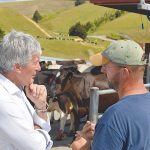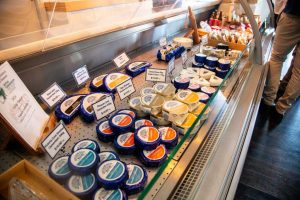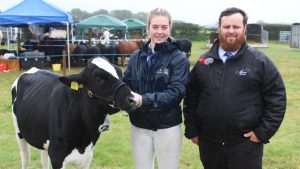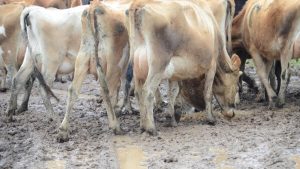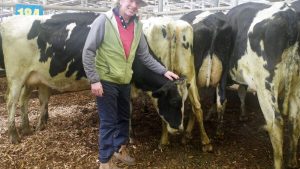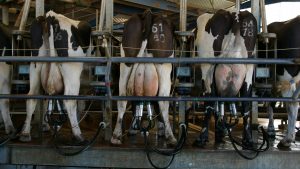
For decades farmers have instinctively used antibiotics to treat livestock for any health issues they may have as this is what they have always been told to do.
However, the tide is changing as governments, supermarkets and other bodies are calling for a complete reduction in the use of antibiotics.
While the determination to do so might be there and alternative products available, it’s the mind set of some farmers that is the stumbling block.
Mastitis continues to be one of the most persistent diseases to challenge dairy industries across the world from a health and welfare perspective to the cow and an economic impact to the dairy farmer.
However, new science has produced alternatives to antibiotics that can completely clean out a cow’s udder that is infected with mastitis and other bacterial infections.
Started just five years ago Dutch company AHV International is growing fast and is using its expertise to develop a number of products that are providing welcome results on farms.
AHV International co-founder and veterinarian Gertjan Streefland said: “Antimicrobial resistance is not a new phenomenon. The plant kingdom has been dealing with this issue almost since the beginning of time. Fortunately, modern scientific research has succeeded in identifying how nature has successfully dealt with this problem.
“AHV was established to convert this science into practical solutions for livestock farmers, who have to deal with the disease-related impact of bacterial infection on a regular basis.
“What we now know is that bacteria must gather together in groups in order to co-ordinate an action and have an impact on the host animal. To make this happen they must communicate with each other through a process called ‘quorum sensing’. In essence, individual bacteria emit signal molecules so as to make this grouping process come about.
“In response, AHV New Pharma solutions have been developed to disrupt this communication process, thereby abolishing the impact that pathogenic bacteria could have when entering a host animal.
“We also know that attacking bacteria produce a biofilm around their cells, which acts to prevent attacks by antibiotics and the animal’s own immune cells. The AHV New Pharma solutions range also acts to break down these biofilms and supports the cow’s natural immune system.
“And, because of this combined activity, invading pathogenic bacteria are more predisposed to attack by the host’s immune system. The end result is a process which directly impacts on the ability of pathogenic bacteria to cause disease without a reliance on antibiotics.”
Udder infections costs dairy farmers billions of dollars per year in lost milk sales and increased veterinary expenses. In the past it has been the norm for farmers to treat all four quarters of a dairy cow that was detected with mastitis, which was increasing the use of antibiotics and costing the farmer more.
AHV International is based in Zwolle in the Netherlands and has developed a number of products including boluses for mastitis and a powder mix for giving calves a good start in life.
“The company’s track record in the Netherlands and a host of other countries around the world confirms the efficacy of the AHV New Pharma approach and its product range,” Dr Streefland said.
“Farmers are fully aware of the need to reduce their reliance on antibiotics. The challenge of anti-microbial resistance is now a key priority for health professionals, veterinarians and the public at large, given the recent emergence of pathogens that are now resistant to almost every antibiotic that is currently available.”
Farmers’ experience
Siem de Boer runs 300 cows in partnership with his brother Jan on their farm near Edam, about 50 kilometres from Amsterdam.
Just two years ago Siem was having big trouble with cryptosporidium in his herd as well as mastitis meaning his vet bill was growing.
“We were having a lot of cases of mastitis in the herd as well as crypto, which left us with unhealthy calves and loss of milk sales,” he said. “Our vet bills were spiralling and I wanted to reduce our use of antibiotics.
“After a chance meeting with Gertjan I decided to use the AHV Cow Extra boluses to tackle mastitis, which worked a treat and had no withdrawal period for the milk.
“A farmer has to have patience when using these products and he has to understand how they work. It’s too easy just to stick a tube of antibiotics into the udder but the substance only penetrates the lower section of the quarter.
“The bolus helps all parts of the quarter and really does get rid of the mastitis. I give around 30 per cent of my cows a bolus these days which really helps.
“All the calves are fed nine litres of milk per day for two weeks and I now mix AHV’s Calfstart into the mix, which has cleared up the crypto.
“It is real easy to see the difference in the calves as they are shining and thriving very well. Currently, I have manged to reduce my use of antibiotics to around 20pc of the herd.”
Wim Lubbersen farms with his twin sons Kevin and Twan at Holten in the Netherlands milking 190 cows.
They have successfully managed to reduce the antibiotic use in the milking cows down to zero in just three months after using the cow boluses to reduce the somatic cell count.
“We use the boluses on cows with high cell counts,” Wim said. “And we use the Calf Start mixed in the milk for the young calves.
“Our cows are milked by three Lely robots, which can detect any abnormalities in the cow’s health including any high somatic cell counts.
“Since starting to use the products we noticed very quickly a reduction in the number of cases of mastitis. Our herd average yield is around 11,000 kilograms in 305 days with the cell count currently running at 100,000.”
AHV International is currently developing a product that will dry cows off in just one day and this will be introduced soon.
The company also says its cow boluses would treat other problems such as mycoplasma bovis in dairy cows which has caused many cows in New Zealand to be culled.


